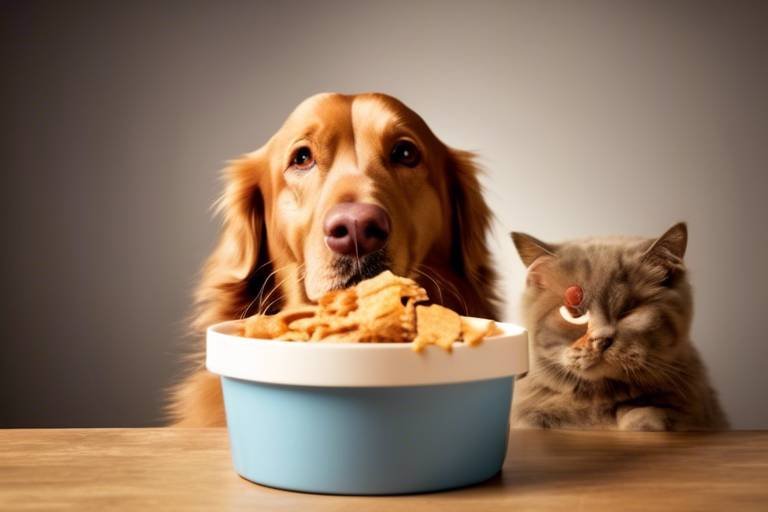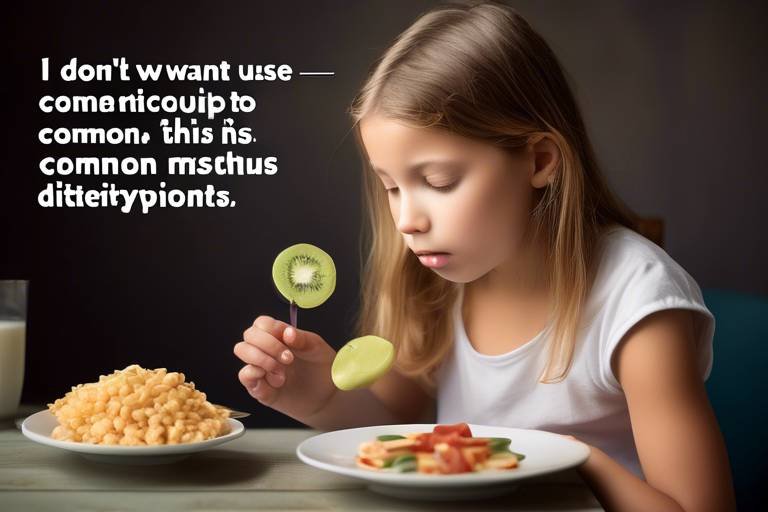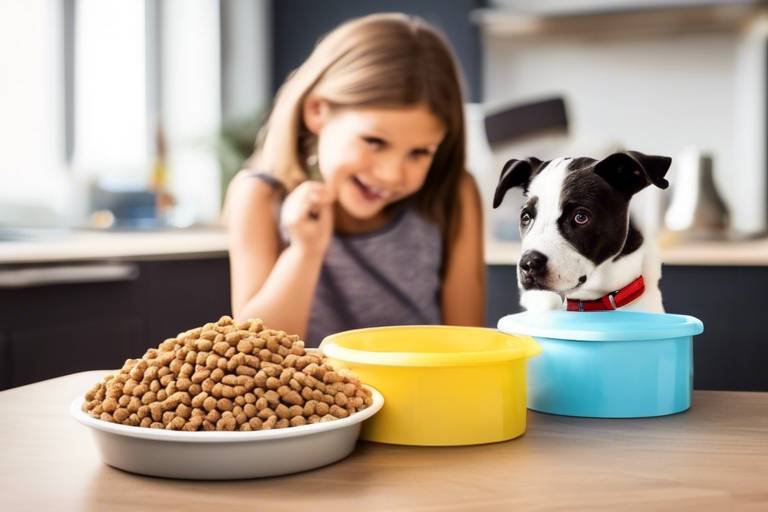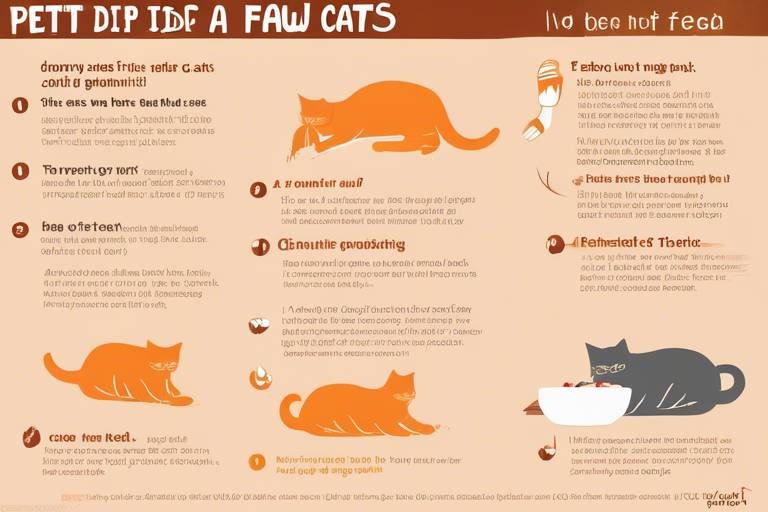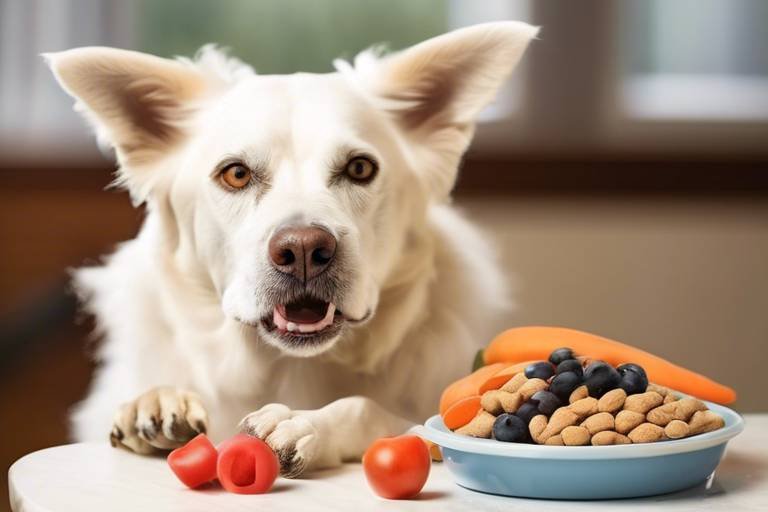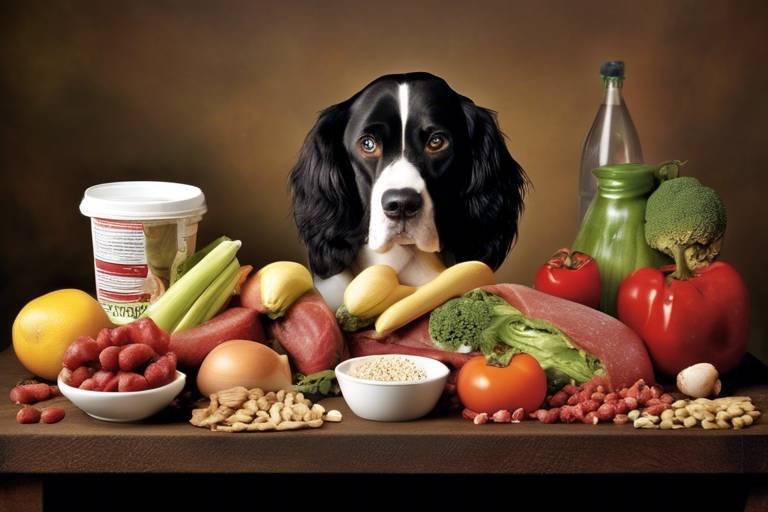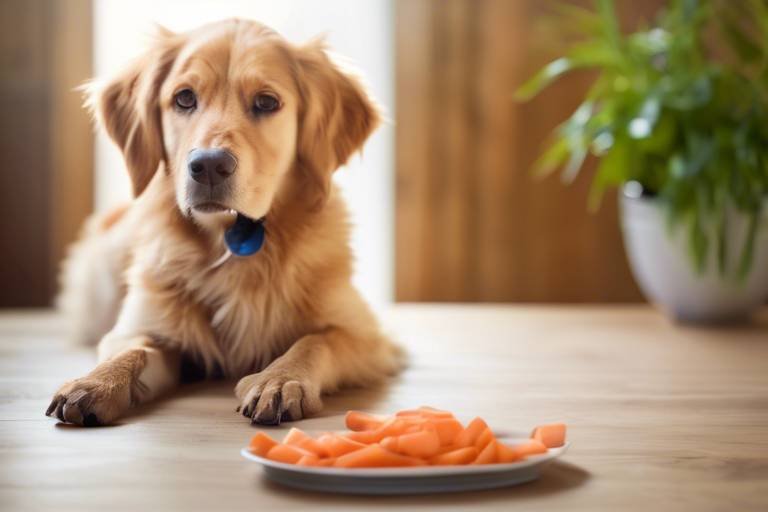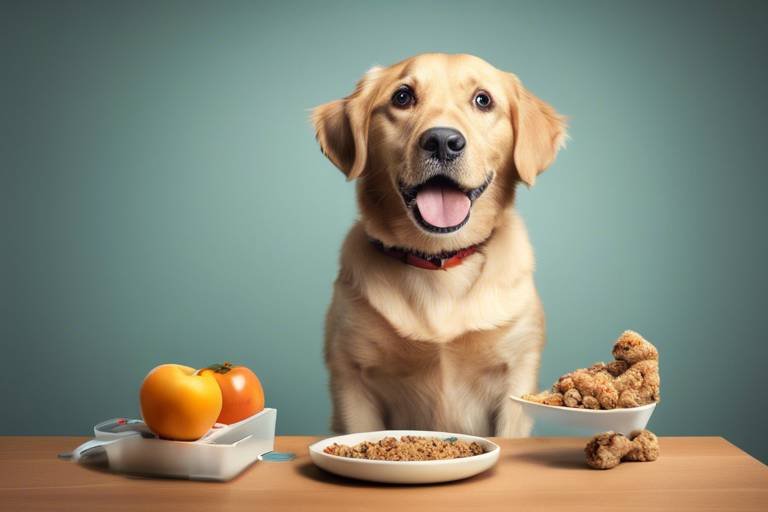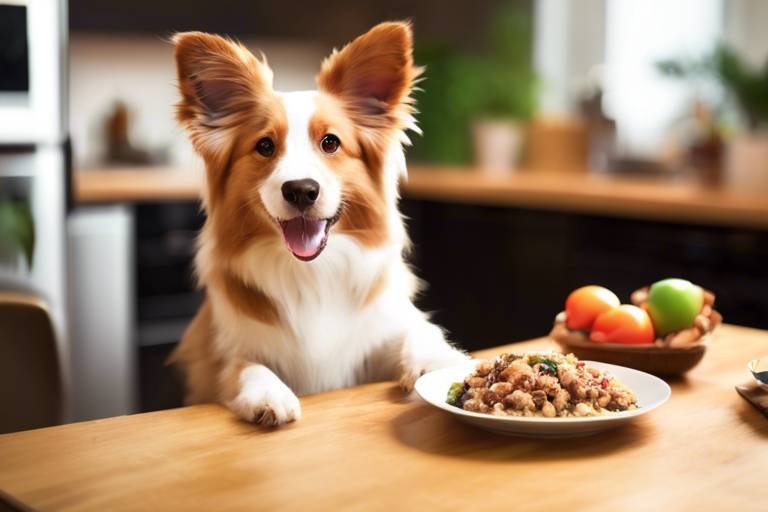Understanding Pet Food Recalls - What to Know
When it comes to our furry friends, nothing is more important than their health and happiness. But did you know that the food you choose for your pet can sometimes pose risks? Pet food recalls are a crucial topic that every pet owner should be aware of. These recalls can happen for a variety of reasons, and understanding them can significantly impact your pet's well-being. Imagine feeding your beloved dog or cat a meal that could potentially harm them—it's a scary thought, right? That's why staying informed is not just a good idea; it's essential.
Pet food recalls occur when products are found to be unsafe for consumption, often due to contamination or mislabeling. This means that the food you've purchased might not only lack the necessary nutrients but could also be harmful. Think of it like a hidden danger lurking in your pet's bowl. Awareness is your best defense. By understanding the reasons behind these recalls, you can take proactive steps to ensure your pet's safety.
In this article, we will delve into the importance of pet food safety, common reasons for recalls, and how you can stay informed. We’ll also discuss what actions to take if you find out that your pet's food has been recalled. By the end of this read, you'll be equipped with the knowledge to safeguard your pet's health and make informed decisions about their diet. So, let's jump right in!
Understanding pet food safety is crucial for pet owners. It ensures that pets receive the nutrition they need without harmful contaminants that could lead to serious health issues. Just like we wouldn't want to eat spoiled or contaminated food, our pets deserve the same level of care and attention. After all, they rely on us to provide them with safe and nutritious meals.
Pet food recalls can occur for various reasons, including contamination, mislabeling, and nutritional deficiencies. Knowing these reasons helps pet owners stay informed and vigilant. For example, contamination can come from harmful bacteria or foreign objects that find their way into the food during production. Mislabeling can mislead pet owners about the ingredients, leading to potential allergies or health issues for pets. Nutritional deficiencies can result in a lack of essential vitamins and minerals, which can have long-term health consequences.
Contamination can result from harmful bacteria, toxins, or foreign objects. Recognizing these risks is essential for preventing health issues in pets and ensuring their safety. Just like a chef wouldn’t serve a dish with spoiled ingredients, pet food manufacturers must adhere to strict safety standards to ensure the food is safe for consumption.
Different types of contaminants can affect pet food, including:
- Salmonella: A bacteria that can cause severe gastrointestinal issues in pets and humans alike.
- Aflatoxins: Toxic compounds produced by certain molds that can lead to liver damage.
- Heavy Metals: Elements like lead and arsenic that can accumulate in the body and cause serious health problems.
Understanding these threats helps pet owners make safer choices for their pets.
Learning how to identify potentially contaminated products, such as reading labels and staying updated on recalls, is vital for maintaining pet health and safety. Always check for any signs of recall on the packaging and keep an eye on reputable sources for updates.
Mislabeling can mislead pet owners about the ingredients in their pet's food, while nutritional deficiencies can lead to health problems. Awareness is key to preventing these issues. If your pet has specific dietary needs, always double-check the label to ensure you're providing the right nutrition.
Staying informed about pet food recalls involves regularly checking official sources and utilizing technology. This proactive approach helps ensure pets consume safe products. Don’t wait for someone to tell you about a recall—take charge of your pet's health by staying in the loop.
Many apps and websites provide real-time alerts about pet food recalls. Leveraging these tools can help pet owners quickly respond to potential threats. Imagine getting a notification on your phone that alerts you to a recall—it's like having a safety net for your pet!
Official resources, such as the FDA and pet food manufacturers, offer reliable information on recalls. Regularly consulting these sources ensures pet owners stay informed and proactive. Bookmark these sites and make it a habit to check them periodically.
If a pet food recall occurs, knowing the proper steps to take is crucial. This includes ceasing use of the product and consulting a veterinarian for guidance. Your pet's health could depend on your quick action.
Properly returning or disposing of recalled pet food is essential to prevent accidental consumption. Understanding the process ensures safety for both pets and owners. Follow the manufacturer's guidelines for returning the product and ensure that it is disposed of safely.
If your pet has consumed recalled food, consulting a veterinarian is vital. They can provide necessary guidance and monitor for any potential health issues. Don’t hesitate to reach out—better safe than sorry!
Q: How can I find out if my pet food has been recalled?
A: You can check the FDA website or use pet food recall alert apps for the latest updates.
Q: What should I do if my pet shows signs of illness after eating recalled food?
A: Contact your veterinarian immediately for advice and treatment options.
Q: Are all pet foods subject to recalls?
A: While most commercial pet foods are subject to recalls, homemade or boutique brands may also face issues. Always stay vigilant.

The Importance of Pet Food Safety
Understanding pet food safety is crucial for pet owners. Just like we pay attention to what we eat, our furry friends deserve the same level of care and scrutiny. After all, the quality of their food directly impacts their health, happiness, and overall well-being. Imagine feeding your beloved dog or cat a meal that could lead to serious health issues—it's a nightmare scenario for any pet parent!
Pet food safety encompasses a variety of factors, including proper ingredient sourcing, manufacturing processes, and storage conditions. When pet food is compromised, it can lead to harmful contaminants that pose serious risks to our pets. It's not just about avoiding bad ingredients; it's about ensuring that your pet receives the nutrition they need without harmful substances lurking in their food. This awareness is paramount, as it empowers you to make informed choices that safeguard your pet's health.
One of the most alarming aspects of pet food safety is the potential for contamination. Whether it's from bacteria like salmonella or toxic substances such as aflatoxins, the truth is that contaminated food can wreak havoc on your pet's digestive system, leading to severe illness or even death in extreme cases. Thus, being vigilant about pet food safety is not just a good practice; it’s a necessity.
Moreover, nutritional deficiencies can also arise from poor-quality pet food, leading to long-term health problems like obesity, diabetes, and heart disease. Pets require a balanced diet tailored to their specific needs, and if their food lacks essential nutrients, it can result in a host of health complications. This is why understanding the importance of pet food safety is not only about avoiding recalls; it’s about ensuring that your pet thrives.
In conclusion, the importance of pet food safety cannot be overstated. By staying informed and proactive about the food you choose for your pet, you can significantly reduce the risk of health issues and ensure that your furry companion lives a long, happy life. Remember, your pet relies on you to make the best choices for them, so take that responsibility seriously!
- What are the signs of contaminated pet food? Look for symptoms like vomiting, diarrhea, lethargy, and loss of appetite.
- How can I check if my pet food is safe? Regularly consult official sources like the FDA and pet food manufacturers for recall updates.
- What should I do if my pet has eaten recalled food? Consult your veterinarian immediately for advice and monitoring.

Common Reasons for Recalls
Pet food recalls can be a source of anxiety for pet owners, but understanding the common reasons behind these recalls can empower you to take proactive measures. Recalls are often initiated when there are concerns regarding the safety and quality of pet food products. The most prevalent causes include contamination, mislabeling, and nutritional deficiencies. Each of these issues can have serious implications for your pet's health, making it essential for you to stay informed.
One of the primary reasons for recalls is contamination. This can occur due to harmful bacteria, toxins, or even foreign objects finding their way into the food during production. For instance, bacteria like Salmonella can pose significant health risks not only to pets but also to humans who handle the contaminated food. Additionally, toxins such as aflatoxins and heavy metals can accumulate in pet food, leading to severe health complications over time. Recognizing the potential for these contaminants is vital for ensuring your pet's safety.
Another common issue is mislabeling. This happens when the ingredients listed on the packaging do not accurately reflect what is inside the bag. For example, a pet food product may boast high-quality meat ingredients, but in reality, it may contain low-quality fillers or by-products. This can mislead pet owners into believing they are providing their pets with a nutritious diet, when, in fact, they are not. Awareness of this issue is crucial for making informed choices about what you feed your furry friends.
Moreover, nutritional deficiencies can also lead to recalls. If a pet food manufacturer fails to include essential vitamins and minerals, it could result in a product that does not meet the nutritional needs of pets. Over time, a lack of proper nutrition can lead to health issues such as obesity, developmental problems, and a weakened immune system. Being vigilant about the nutritional content of your pet's food can help prevent these issues from arising.
In summary, understanding the common reasons for pet food recalls—contamination, mislabeling, and nutritional deficiencies—can help you become a more informed pet owner. By recognizing these risks, you can make better choices and ensure that your beloved pets receive the safe and nutritious food they deserve.
- What should I do if I hear about a recall? If you hear about a recall, immediately stop using the product and check the lot number on your packaging. Consult official sources for more information.
- How can I stay updated on pet food recalls? Regularly check official websites like the FDA or use apps designed to alert you about recalls.
- Can recalled food harm my pet? Yes, contaminated or improperly labeled food can pose serious health risks to your pet, so it’s crucial to act quickly.
- What steps should I take if my pet has consumed recalled food? Consult your veterinarian for advice and potential health monitoring.
Contamination Risks
When it comes to our furry friends, ensuring their health and safety is paramount. One of the biggest threats that pet owners face is the risk of contamination in pet food. Contamination can occur at various stages of the food production process, from the sourcing of ingredients to the packaging of the final product. It’s like a hidden minefield; one wrong step can lead to serious health issues for your pet. So, what exactly are these contamination risks?
Contamination can stem from several sources, including:
- Bacteria: Harmful bacteria such as Salmonella and E. coli can find their way into pet food, posing severe health risks.
- Toxins: Natural toxins, like aflatoxins, produced by mold, can contaminate ingredients like grains and nuts.
- Foreign Objects: Sometimes, manufacturing errors can lead to foreign objects, such as plastic or metal shavings, ending up in pet food.
Understanding these risks is crucial for pet owners. For instance, Salmonella contamination can lead to gastrointestinal issues not just for pets but for humans who handle the contaminated food. It’s a two-way street; a sick pet can also mean a sick owner. This is why vigilance is key. Always check for recalls and stay informed about any potential contamination issues.
It’s also essential to recognize the signs of contamination. If your pet exhibits symptoms such as vomiting, diarrhea, or lethargy after eating a particular food, it’s time to act. Keep an eye out for any changes in your pet’s behavior or health after introducing a new diet. Remember, prevention is always better than cure, and being proactive can save your pet from unnecessary suffering.
In conclusion, contamination risks in pet food are a serious concern that every pet owner should take seriously. By understanding the potential hazards and remaining vigilant, you can ensure that your pet enjoys a safe and healthy diet, free from harmful contaminants.
- What should I do if I suspect my pet's food is contaminated? If you suspect contamination, immediately stop feeding the food to your pet and consult your veterinarian for advice.
- How can I stay updated on pet food recalls? Regularly check official websites like the FDA or use pet food recall alert apps to stay informed.
- Are all pet food brands subject to recalls? Yes, all brands can potentially be recalled, so it’s important to stay vigilant regardless of the brand you choose.
Types of Contaminants
When it comes to pet food safety, understanding the that can compromise the health of your furry friends is crucial. Contaminants can come from various sources and can pose serious health risks to pets if ingested. Here are some of the most common types of contaminants that pet owners should be aware of:
- Salmonella: This is a harmful bacteria that can cause severe gastrointestinal illness in pets. It often originates from raw meat or contaminated ingredients.
- Aflatoxins: These are toxic compounds produced by certain molds that can grow on grains and nuts. Aflatoxins can lead to liver damage and other serious health issues in pets.
- Heavy Metals: Elements like lead, arsenic, and mercury can find their way into pet food through contaminated ingredients. Chronic exposure can result in neurological and developmental problems.
- Foreign Objects: Sometimes, pet food may contain foreign objects such as plastic, glass, or metal shards, which can cause choking or internal injuries.
Each of these contaminants can lead to a range of health issues, from mild digestive upset to severe, life-threatening conditions. For instance, salmonella can not only affect pets but also pose a risk to humans, particularly if the contaminated food is handled improperly. Aflatoxins are particularly insidious as they can accumulate in the body over time, leading to chronic health problems.
To make informed choices for your pet, it’s essential to stay vigilant about the ingredients in their food. Always check for any recalls or warnings regarding specific brands or batches. Additionally, understanding the signs of contamination can help you act quickly if you suspect that your pet's food may be unsafe. Symptoms to watch for include vomiting, diarrhea, lethargy, and loss of appetite. If you notice any of these signs after your pet consumes food that you suspect may be contaminated, it’s important to consult your veterinarian immediately.
In summary, being aware of the types of contaminants that can affect pet food is an essential part of being a responsible pet owner. By staying informed and proactive, you can help ensure your pet remains healthy and safe from potential dangers lurking in their food.
What should I do if I suspect my pet's food is contaminated?
If you suspect contamination, stop using the product immediately and consult your veterinarian. Monitor your pet for any signs of illness.
How can I find out if a pet food has been recalled?
You can check official websites like the FDA or use apps that provide real-time alerts about pet food recalls.
Are all pet foods at risk of contamination?
While not all pet foods are at risk, contamination can occur in any brand or type. It's essential to stay informed and vigilant.
What are the symptoms of foodborne illness in pets?
Symptoms can include vomiting, diarrhea, lethargy, and loss of appetite. If you notice these signs, consult your veterinarian.
Identifying Contaminated Products
Identifying contaminated pet food products is essential for safeguarding your furry friends from potential health risks. The first step in this process is to become a vigilant label reader. Labels often contain vital information about the ingredients and any potential allergens. When purchasing pet food, always check for any recent recalls or alerts associated with that specific brand or product. This information can typically be found on the manufacturer's website or through reliable resources such as the FDA's pet food recall page.
Moreover, it's crucial to be aware of the signs that may indicate contamination. For instance, if you notice any unusual smells, changes in texture, or discoloration in the food, it's a red flag that something might be off. Pets can also react adversely to contaminated food, so watch for symptoms like vomiting, diarrhea, or lethargy. If your pet exhibits any of these signs after consuming a new food, it's time to investigate further.
In addition to being proactive about checking for recalls, consider utilizing technology to your advantage. Many apps and websites are dedicated to providing real-time alerts about pet food recalls. By signing up for notifications, you can stay informed about any issues that might affect your pet's food. This proactive approach not only helps you avoid potential dangers but also empowers you to make informed decisions for your pet's health.
Lastly, it's a good idea to maintain a list of the pet food brands you use regularly. This list will make it easier to cross-reference with recall announcements. If you find that a product you have at home is on the list, take immediate action by discontinuing use and consulting your veterinarian if necessary. Remember, being informed and vigilant is key to keeping your pet safe from contaminated products.
- How can I find out if my pet food has been recalled? Regularly check the FDA website or the manufacturer's website for updates on recalls.
- What should I do if I find out my pet's food has been recalled? Stop using the product immediately and consult your veterinarian for further guidance.
- Are there specific signs that indicate my pet's food might be contaminated? Yes, signs include unusual smells, changes in texture, discoloration, or symptoms like vomiting and diarrhea in your pet.
- Can technology help me stay informed about pet food recalls? Absolutely! There are numerous apps and websites that provide real-time alerts about pet food recalls.
Mislabeling and Nutritional Deficiencies
When it comes to our furry friends, we want to provide them with the best nutrition possible. However, one of the significant challenges pet owners face is the issue of mislabeling in pet food products. Mislabeling can lead to a situation where the ingredients listed on the packaging do not accurately reflect what’s inside the bag. Imagine buying a bag of food that claims to be rich in proteins, only to find out later that it contains fillers instead. This not only misleads pet owners but can also result in nutritional deficiencies that can harm your pet's health.
Pet food manufacturers are required to follow strict guidelines about what they put on their labels, but mistakes can happen. Sometimes, a product may contain ingredients that are not disclosed, which can be particularly dangerous for pets with allergies. For instance, if a dog is allergic to chicken but the food is labeled as “beef-flavored,” the owner might unknowingly put their pet at risk. This is why it’s essential to read labels carefully and be aware of what you’re feeding your pet.
But mislabeling is just one piece of the puzzle. Nutritional deficiencies can arise from a variety of factors, including poor ingredient quality and an unbalanced formulation. Pets require a specific balance of nutrients to thrive, and when their food lacks essential vitamins, minerals, or proteins, it can lead to serious health issues. Some common nutritional deficiencies include:
- Protein Deficiency: Can lead to muscle loss and a weakened immune system.
- Vitamin A Deficiency: Can cause vision problems and skin issues.
- Calcium Deficiency: Can lead to bone disorders and dental problems.
To ensure the health and well-being of your pet, it’s crucial to choose high-quality pet food from reputable brands. Look for products that are AAFCO-approved (Association of American Feed Control Officials), as this indicates that the food meets specific nutritional standards. Additionally, keeping an eye on the ingredient list can help you avoid potential pitfalls of mislabeling. Always opt for brands that are transparent about their ingredients and sourcing practices.
In summary, being aware of the risks associated with mislabeling and nutritional deficiencies is vital for every pet owner. By staying informed and choosing wisely, you can help ensure that your beloved pet receives the nutrition they need to live a happy, healthy life.
Q: How can I tell if my pet food is mislabeled?
A: Look for discrepancies between the ingredient list and the product claims. If the food claims to be high in a certain protein but lists a lower-quality filler as the primary ingredient, it may be mislabeled.
Q: What should I do if I suspect my pet's food is nutritionally deficient?
A: Consult your veterinarian. They can assess your pet's diet and recommend appropriate changes or supplements to ensure your pet receives the balanced nutrition they need.
Q: Are there specific brands known for high-quality pet food?
A: While it varies by region, brands that are AAFCO-approved and have positive reviews from pet owners and veterinarians are generally a good choice. Always do your research before making a purchase.

How to Stay Informed About Recalls
Staying informed about pet food recalls is not just a good idea; it's a necessity for every pet owner who wants to keep their furry friends safe and healthy. With the ever-changing landscape of pet food products, being proactive can make all the difference. So, how can you stay in the loop? Well, it starts with regularly checking official resources and using technology to your advantage.
First, let’s talk about the power of technology. In today’s digital age, there are numerous apps and websites dedicated to providing real-time alerts about pet food recalls. Imagine receiving an instant notification on your phone about a recall that could affect your pet’s food! This kind of immediate information can help you respond quickly and prevent potential health issues. Some of the popular platforms include:
- FDA Pet Food Recalls: The Food and Drug Administration maintains a comprehensive list of recalls, which is updated regularly.
- Pet Food Manufacturer Websites: Many manufacturers post recall alerts directly on their sites, so it's wise to check them frequently.
- Dedicated Pet Safety Apps: Apps like "Pet Poison Helpline" and others offer notifications and resources to keep you informed.
Additionally, following social media accounts of pet food brands and veterinary organizations can provide timely updates. These platforms often share important news and tips that could help you avoid a recall situation altogether. It’s like having a safety net that keeps you connected to the latest information.
Now, let’s not forget the importance of official resources. The FDA is a goldmine of information when it comes to pet food safety. Their website features a dedicated section for pet food recalls, which is a must-visit for any concerned pet parent. Moreover, pet food manufacturers are legally obligated to inform consumers about recalls, so subscribing to their newsletters or alerts can be beneficial. Regularly consulting these sources ensures that you are not only informed but also proactive in your approach to pet food safety.
In summary, staying informed about pet food recalls is about creating a habit of checking reliable sources and utilizing technology. Your pet's health is worth the effort, and being proactive can prevent serious issues down the line. So, take the time to set up notifications, check official resources, and engage with the community. You’ll feel more confident knowing that you’re doing everything you can to protect your beloved pet.
Q1: How often should I check for pet food recalls?
A1: It’s a good practice to check for recalls at least once a week. Additionally, set up alerts on your phone for immediate notifications.
Q2: What should I do if I find out my pet's food has been recalled?
A2: Immediately stop using the product, dispose of it properly, and consult your veterinarian for further guidance.
Q3: Are all pet food recalls serious?
A3: Not all recalls are critical, but it’s essential to take every recall seriously and assess the potential risks to your pet's health.
Q4: Can I trust social media for recall information?
A4: While social media can provide timely updates, always verify the information through official sources like the FDA or the manufacturer's website.
Utilizing Technology for Alerts
In today's fast-paced world, technology plays a pivotal role in keeping our furry friends safe. With the rise of smartphones and apps, pet owners can now receive real-time alerts about pet food recalls right at their fingertips. Imagine being able to get instant notifications that could potentially save your pet's life—it's like having a personal guardian for your pet's health!
One of the best ways to stay ahead of potential risks is by using dedicated apps designed specifically for pet owners. These apps often provide alerts on recalls, ingredient changes, and even health tips tailored to your pet's needs. For instance, apps like Pet Food Recall Alert and PetMD can keep you informed about the latest news in pet food safety, ensuring you're never caught off guard. Additionally, many of these platforms allow you to customize notifications based on your pet's dietary preferences, making it easier to filter out the noise and get the information that matters most.
Moreover, social media platforms can also serve as valuable tools for staying updated. Following reputable pet food brands, veterinarians, and pet health organizations on platforms like Twitter and Facebook can provide instant access to important information. Many brands announce recalls on their social media pages, so being in the loop can make a huge difference.
But wait, there’s more! Websites like the FDA and CDC regularly update their pages with information about food recalls. Subscribing to their newsletters or checking their websites frequently can keep you in the know. You can even set up Google Alerts for specific pet food brands or keywords like “pet food recall” to receive notifications directly in your inbox. This proactive approach is essential in ensuring that your pet's diet remains safe and healthy.
In summary, leveraging technology for alerts is not just about convenience; it's about being proactive in safeguarding your pet's health. With the right tools at your disposal, you can ensure that your pet is consuming safe food and enjoying a long, happy life. So, why not take advantage of these technological advancements? Your pet deserves the best!
- How can I find out if my pet food has been recalled? You can check official sources like the FDA website, as well as dedicated pet food recall apps and social media pages of pet food brands.
- What should I do if I discover my pet's food has been recalled? Immediately stop using the product, consult your veterinarian, and follow the manufacturer's instructions for returning or disposing of the food.
- Are there specific apps for pet food recalls? Yes, there are several apps available such as Pet Food Recall Alert and PetMD that provide real-time notifications about recalls.
Official Resources for Updates
Staying updated on pet food recalls is essential for every pet owner. With the ever-evolving landscape of pet food safety, having reliable sources of information can make a significant difference in ensuring your furry friends remain healthy and safe. One of the most trusted sources for recall information is the U.S. Food and Drug Administration (FDA). The FDA maintains a dedicated section on its website that lists all current recalls, market withdrawals, and safety alerts regarding pet food products. By regularly visiting the FDA's website, you can keep abreast of any potential risks associated with the food you provide to your pets.
Another valuable resource is the American Veterinary Medical Association (AVMA). They provide insights not only on recalls but also on the safety and nutritional standards of various pet food brands. Their website often features articles and updates that can help pet owners make informed decisions regarding their pets' diets.
In addition to these official resources, many pet food manufacturers have their own websites where they post updates about recalls. It’s a good practice to check the website of the brand you use regularly. They often provide contact information for customer service, where you can ask questions regarding any concerns you might have about their products.
To streamline the process of staying informed, consider signing up for email alerts from these organizations. Many official sites allow you to subscribe to newsletters or alerts that provide immediate updates on recalls. This proactive approach can save you time and ensure that you never miss a critical update.
Here’s a quick reference table summarizing some official resources for pet food recall updates:
| Resource | Website | Details |
|---|---|---|
| U.S. Food and Drug Administration (FDA) | FDA Pet Food Recalls | Current recalls, market withdrawals, and safety alerts. |
| American Veterinary Medical Association (AVMA) | AVMA | Insights on safety and nutritional standards. |
| Pet Food Manufacturer Websites | Varies by brand | Updates and contact information for specific brands. |
By utilizing these resources, you can take charge of your pet’s health and make informed decisions about their food. Remember, being proactive is key. The more you know, the better equipped you are to protect your beloved pets from potential dangers associated with pet food recalls.
Q: How often do pet food recalls happen?
A: Pet food recalls can occur sporadically throughout the year, often in response to contamination or safety concerns. It's essential to stay updated regularly.
Q: What should I do if I find out my pet's food has been recalled?
A: Immediately stop using the product, check for any symptoms in your pet, and consult your veterinarian for guidance.
Q: Where can I find reliable information on pet food safety?
A: The FDA, AVMA, and pet food manufacturers' websites are excellent sources for reliable information on pet food safety and recalls.
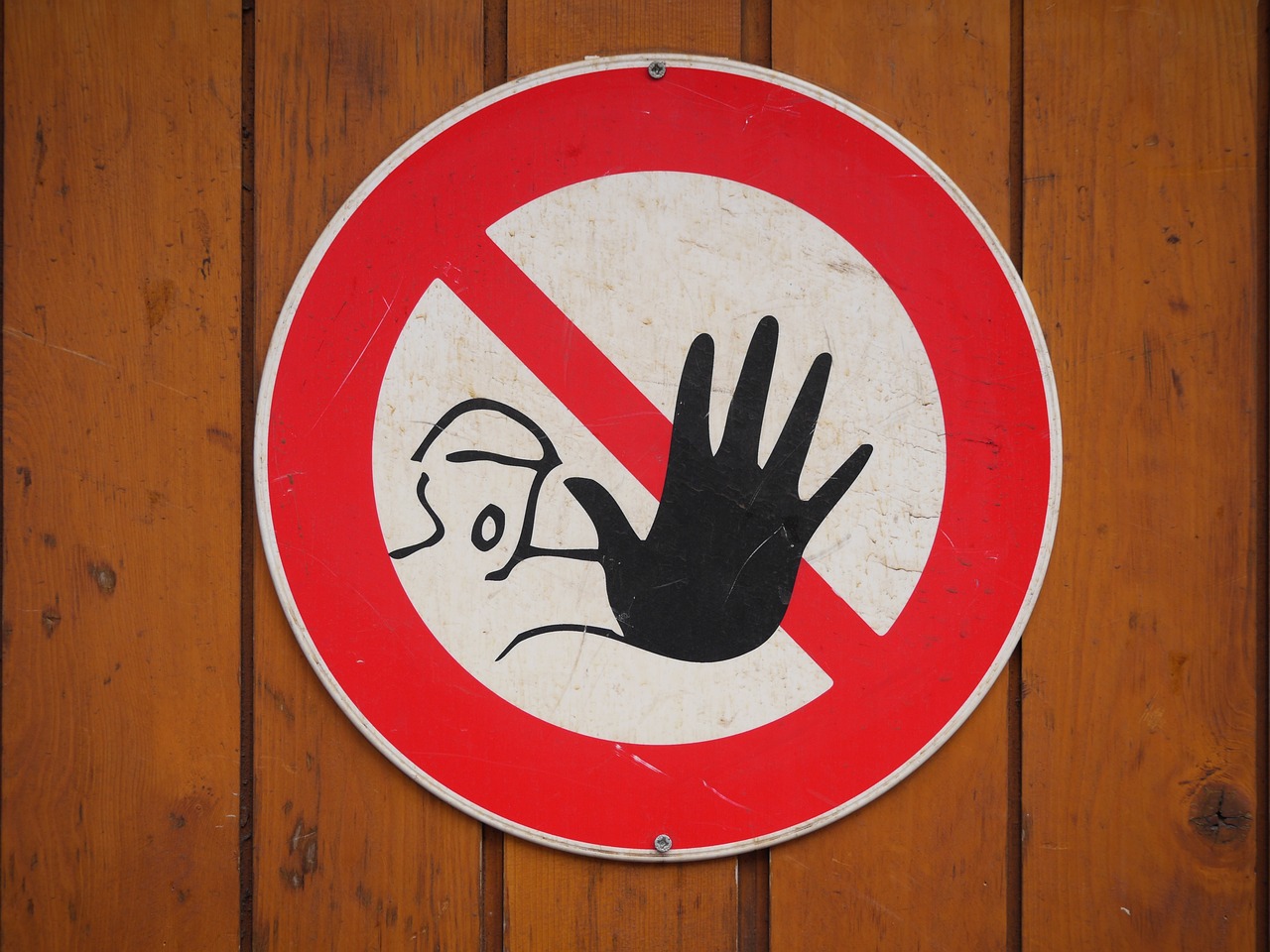
What to Do If Your Pet's Food Is Recalled
When a pet food recall is announced, it can send shockwaves through the pet owner community. The first thing to remember is to remain calm and take immediate action. Ignoring the recall could endanger your furry friend’s health. So, what should you do? First and foremost, stop using the recalled product. This may seem like a no-brainer, but it's crucial to prevent any potential health risks to your pet. If you have any remaining food from the affected batch, it’s best to check the recall notice for specific details, including product names, lot numbers, and expiration dates.
Next, consider the proper disposal of the recalled product. Simply throwing it in the trash may not be enough, especially if your pet has already consumed some of it. Instead, you might want to return it to the store where you purchased it. Many retailers have policies in place for handling recalls, and they may offer a refund or exchange. If returning isn’t an option, securely sealing the food in a bag and disposing of it in a way that prevents any other animals from accessing it is essential.
It's also important to monitor your pet for any signs of illness. Symptoms can vary widely depending on the type of contamination. For example, if the recall is due to salmonella, your pet might exhibit symptoms like vomiting, diarrhea, or lethargy. If your pet shows any unusual behavior or symptoms, consulting a veterinarian is vital. They can provide guidance on what to look out for and may suggest tests to ensure your pet’s health is not compromised.
Additionally, keeping records of your pet's food consumption is a good practice. This includes noting when you purchased the food and how much your pet has eaten. This information can be helpful when discussing your pet's health with your veterinarian. Furthermore, consider switching to a different brand or type of food while you evaluate your options. Always look for brands with a strong reputation for safety and quality.
Finally, stay informed. Sign up for alerts from reliable sources, such as the FDA or pet food manufacturers, to receive timely information about any future recalls. Being proactive can help you safeguard your pet's health.
- What should I do if my pet has eaten recalled food?
Contact your veterinarian immediately for guidance and monitoring. - How can I find out if my pet food has been recalled?
Check official sources like the FDA website or the manufacturer's website for the latest recall information. - Is it safe to feed my pet food from a different batch?
It depends on the recall specifics. Always consult your vet if you're unsure. - What are the common symptoms of pet food contamination?
Look for signs like vomiting, diarrhea, lethargy, or unusual behavior.
Returning or Disposing of Recalled Products
When a pet food recall is announced, it’s crucial to act swiftly and responsibly. The first step is to stop using the recalled product immediately. Continuing to feed your pet food that has been flagged for safety concerns can lead to serious health risks. But what should you do with the remaining food? Here are some options:
Most manufacturers provide specific instructions for returning or disposing of recalled products. It’s important to follow these guidelines to ensure safety. If you decide to return the product, check with the retailer where you purchased it, as many stores have a straightforward return policy for recalled items. They may require proof of purchase, so keep your receipts handy!
If returning the product isn’t feasible, proper disposal is essential. Here are some steps to follow:
- Seal the Product: Place the recalled food in a secure bag or container to prevent any accidental consumption by your pets or other animals.
- Check Local Regulations: Some areas have specific guidelines for disposing of pet food, especially if it contains harmful substances. It’s wise to consult your local waste management authority.
- Dispose of Safely: If allowed, you can throw the sealed product in your regular trash. However, if the food poses a significant risk, consider contacting local animal shelters or veterinary clinics to see if they have specific disposal recommendations.
In addition to these steps, it’s important to monitor your pet for any signs of illness if they have consumed the recalled food. Symptoms can vary, but common signs include vomiting, diarrhea, lethargy, or loss of appetite. If you notice any of these symptoms, consult your veterinarian immediately for further guidance.
Remember, staying informed and taking action can protect your beloved pets from potential health hazards. By responsibly returning or disposing of recalled products, you’re not only safeguarding your pet’s health but also contributing to a broader effort to maintain pet food safety standards.
Q: What should I do if my pet has eaten recalled food?
A: If your pet has consumed recalled food, contact your veterinarian right away. They can provide specific advice based on your pet's health and the nature of the recall.
Q: How can I find out if my pet food is recalled?
A: Regularly check official sources like the FDA website, pet food manufacturer websites, and reliable pet health apps for updates on recalls.
Q: Can I get a refund for recalled pet food?
A: Yes, most retailers offer refunds or exchanges for recalled products. Keep your receipt and check with the store where you made the purchase.
Q: What are the signs that my pet might be sick from recalled food?
A: Symptoms can include vomiting, diarrhea, lethargy, and loss of appetite. If you observe any of these signs, seek veterinary care immediately.
Consulting Your Veterinarian
When a pet food recall hits the news, it can send a wave of panic through pet owners. You might be wondering, "What if my furry friend has eaten that food?" This is where becomes essential. Your vet is your first line of defense in ensuring your pet's health and safety. They have the expertise to guide you through the necessary steps and help you determine if any action is needed based on your pet's specific situation.
First and foremost, if you discover that the food your pet has been eating is on the recall list, don't wait. Call your veterinarian immediately. They will ask you questions about the product, such as the brand, lot number, and how long your pet has been consuming it. This information helps them assess any potential risks your pet may face. For instance, if the recall is due to contamination with harmful bacteria like salmonella, your vet will want to know if your pet is showing any signs of illness.
In many cases, pets who have consumed recalled food may not show immediate symptoms, but it’s still crucial to keep an eye on them. Your veterinarian can provide you with a checklist of symptoms to watch for, such as:
- Vomiting
- Diarrhea
- Loss of appetite
- Lethargy
- Abdominal pain
If your pet exhibits any of these symptoms, your veterinarian may recommend bringing them in for an examination. They could conduct tests to determine if your pet has been affected by the recalled food. Early detection is key to ensuring your pet's health, and your vet can provide treatments if necessary.
Moreover, your veterinarian can also advise you on how to transition your pet to a new food safely. Switching pet foods can be tricky, and doing it too quickly can lead to digestive upset. They might suggest a gradual transition plan, which involves mixing the old food with the new food over several days to help your pet adjust.
In summary, consulting your veterinarian is not just a precaution; it's a vital step in safeguarding your pet's health. They can provide personalized advice based on your pet's health history and the specifics of the recall. Remember, your vet is there to help, so don’t hesitate to reach out whenever you have concerns about your pet's food safety.
- What should I do if my pet has eaten recalled food?
Immediately contact your veterinarian for guidance and monitor your pet for any symptoms. - How can I find out if my pet food is recalled?
Regularly check official sources like the FDA website or pet food manufacturer announcements. - Are all recalled pet foods dangerous?
Not all recalls indicate immediate danger, but it's essential to stay informed and consult your vet. - How can I safely transition my pet to a new food?
Consult your veterinarian for a gradual transition plan to avoid digestive issues.
Frequently Asked Questions
- What should I do if I hear about a pet food recall?
If you hear about a pet food recall, the first thing you should do is stop using the affected product immediately. Check the recall details to see if your pet's food is included and consult your veterinarian for guidance on what to do next.
- How can I find out if my pet's food has been recalled?
You can find out if your pet's food has been recalled by checking official sources such as the FDA website, pet food manufacturer websites, and using apps that provide real-time recall alerts. Staying informed is crucial for your pet's safety.
- What are the common reasons for pet food recalls?
Pet food recalls can happen for several reasons, including contamination from harmful bacteria like salmonella, mislabeling of ingredients, and nutritional deficiencies. Understanding these reasons helps you keep an eye out for potential risks.
- How can I identify potentially contaminated pet food?
To identify potentially contaminated pet food, always read the labels carefully and stay updated on recall announcements. Look for signs of contamination, such as unusual smells or colors, and trust your instincts—if something seems off, don’t feed it to your pet!
- What should I do with recalled pet food?
With recalled pet food, you should either return it to the place of purchase for a refund or dispose of it safely to prevent accidental consumption. Ensure that it's out of reach of your pets and other animals.
- How do I know if my pet is affected by a recalled food?
If your pet has consumed recalled food, watch for symptoms like vomiting, diarrhea, lethargy, or loss of appetite. If you notice any of these signs, contact your veterinarian immediately for advice and possible treatment.
- Are all pet food recalls dangerous?
Not all pet food recalls are equally dangerous, but it’s best to take every recall seriously. Some recalls may involve minor issues, while others can pose serious health risks. Always err on the side of caution and consult with your vet if unsure.



